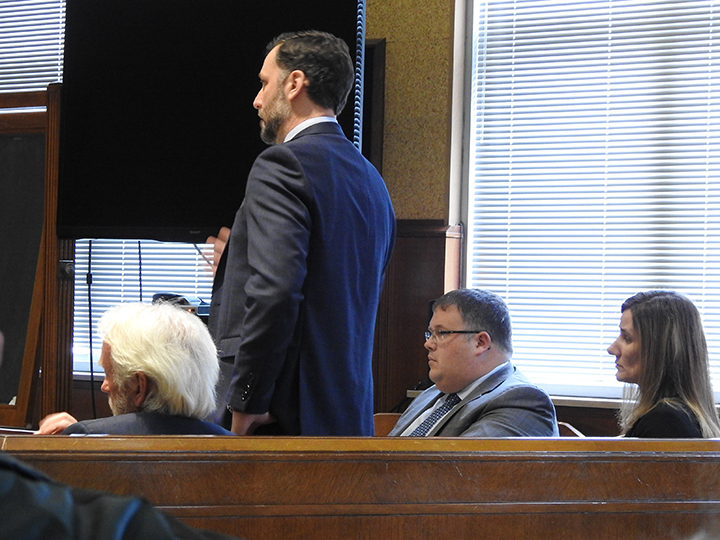Heather Winfield trial delayed again

News File Photo Attorneys for Heather Winfield present arguments in Alpena’s 26th Circuit Court earlier this year.
ALPENA — Pages and pages of Facebook data, combined with mounting preparation time needed because of decisions made in the courtroom on Wednesday, have led to a delay in the sex assault trial of former Alpena Public Schools teacher Heather Winfield.
In an hours-long hearing in Alpena’s 26th Circuit Court on Wednesday, Judge Roy C. Hayes III addressed multiple motions by both sides in the case against Winfield, who is accused of having sex with a former student.
Winfield has denied the allegations. The News does not identify alleged victims of sexual assault.
After resigning in the face of termination by APS in 2016, Winfield also worked as a long-term substitute in Hillman schools.
Her trial, originally scheduled for late February, will be pushed back to April 22, giving defense attorneys more time to process new information, including a voluminous record from a Facebook account provided by the Michigan State Police.
The delay will also leave more time for the possibility of retrieving information from Google that both sides think will help prove their case. An investigation tool recently becoming popular with law enforcement, the Google-provided data can take as long as a year to be prepared and may not make it in time for use at the trial.
The two-month delay — the second time the trial date has been changed because of the amount of data produced by the case — will give attorneys time to respond to several other decisions made by Hayes during vigorous debate between the two parties at Wednesday’s hearing.
Winfield was arrested in January 2019.
PRODUCING EVIDENCE
Accusing the prosecution of violating court procedure by withholding evidence, the defense requested that the judge require Alpena County Assistant Prosecutor Cynthia Muszynski to record any interactions with witnesses between now and the time of the trial.
The accusation comes after a video recording of an interview with the alleged victim was released to the defense a year after it was made.
While the defense is not required to share information with the opposing side, the prosecution in a criminal trial is legally obligated to share with the defense any police reports, statements made by witnesses, or other evidence they intend to introduce at trial. That includes information that could potentially be used to contradict the defendant’s supposed guilt.
Attorney theories and trial strategies don’t have to be shared.
At Wednesday’s hearing, Winfield’s attorneys said some witness interviews had not been recorded by the prosecution, robbing them of the opportunity to prepare a defense for whatever those witnesses might have said.
If the state is trying to put someone behind bars for 25 years to life, defense attorney Alan Curtis said, they should want to be completely open about what they intend to do at trial.
Sharing full recordings of interviews harms the prosecution, countered Muszynski, who indicated her office had shared all available written and recorded reports with the defense.
Unlike in a court setting, pretrial witness interviews can include leading questions as attorneys seek specific information to bolster their case. Sharing an interview with the defense would reveal the prosecution’s strategy through the line of questioning used, Muszynski said.
Hayes denied the defense’s request, saying he would give Muszynski the benefit of the doubt that she would make a good-faith effort to share all relevant information gleaned in future interviews.
PROFILER TESTIMONY
An FBI profiler proposed by the Muszynski as an expert witness will be allowed to testify — but with some restrictions, the judge ruled.
Special Agent Alicia McShane, who in September gave initial testimony to the court, may educate the jury regarding typical victim responses to sexual abuse based on her experience. The profiler may also speak to the grooming behavior of many predators.
But the prosecution’s stated intent to use the FBI expert to teach the jury that a predator doesn’t fit old stereotypes was met with doubt from the judge.
“How is that helpful?” Hayes asked.
An informed community shouldn’t need an expert to explain that to them, he indicated.
McShane’s testimony must be limited to generally accepted psychological observations about standard behavior and can’t stray into larger implications or specific applications to the case at hand, about which she has no knowledge, the judge ruled.
IN-CAMERA REVIEW
Hayes will review records from counseling that was offered to the alleged victim after the allegations of an inappropriate relationship between him and Winfield first arose in 2016.
Because the counseling was directly related to the allegations — which at that time were denied by the boy — it’s possible those records, usually protected by privacy laws, could contain evidence useful to the defense, Hayes said.
He ordered an in-camera review, which allows a judge to examine certain information to see if it should be given to attorneys.
Counseling records from before the allegations were made will not be reviewed.
Other rulings by Hayes will allow a medical physician to testify, despite objections from the defense, and denied Muszynski ‘s request to learn the relevance of some witnesses expected to be presented by the defense.
“I can’t require the defense to put all their cards on the table face up,” Hayes said.
Julie Riddle can be reached at 989-358-5693, jriddle@thealpenanews.com or on Twitter @jriddleX.


